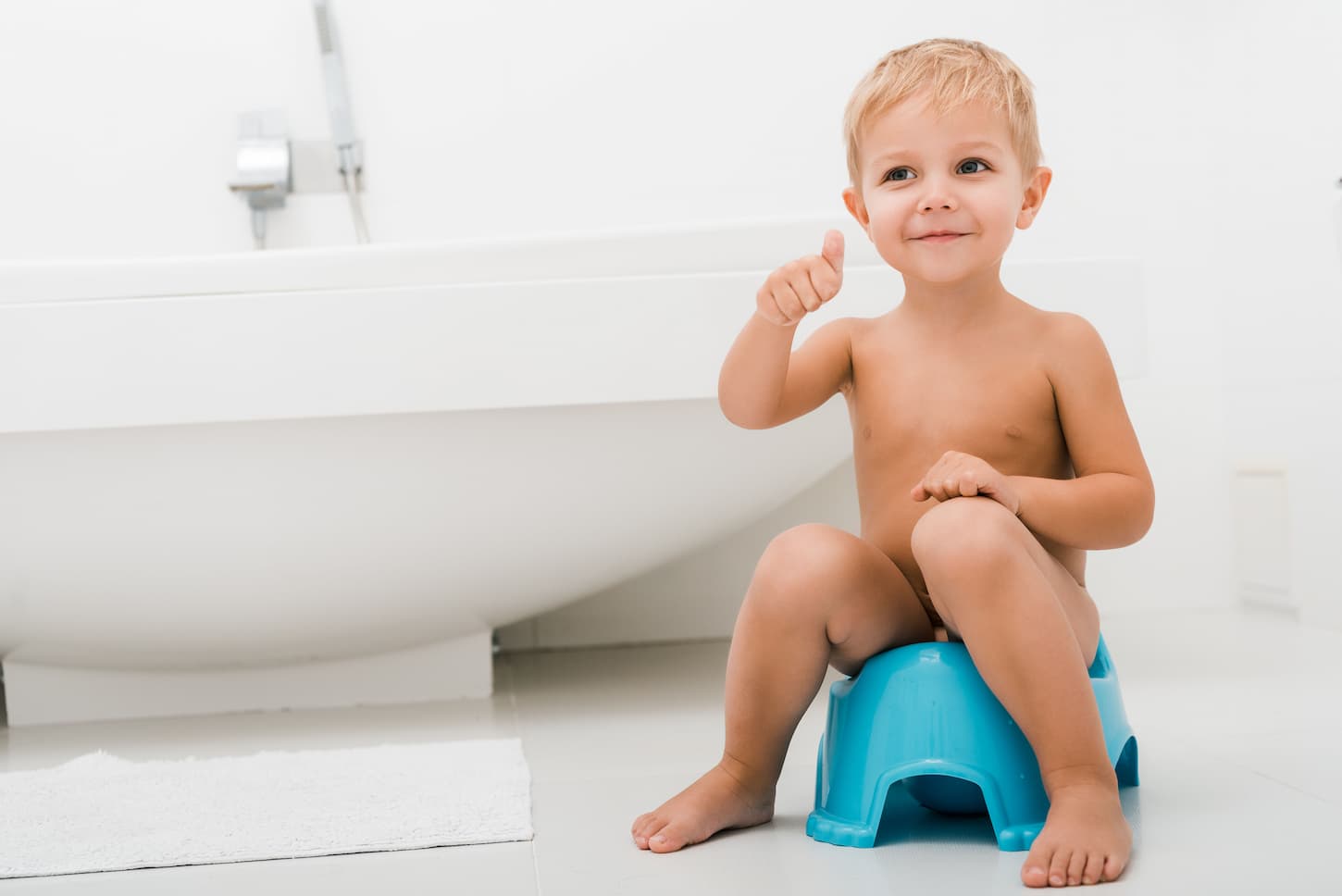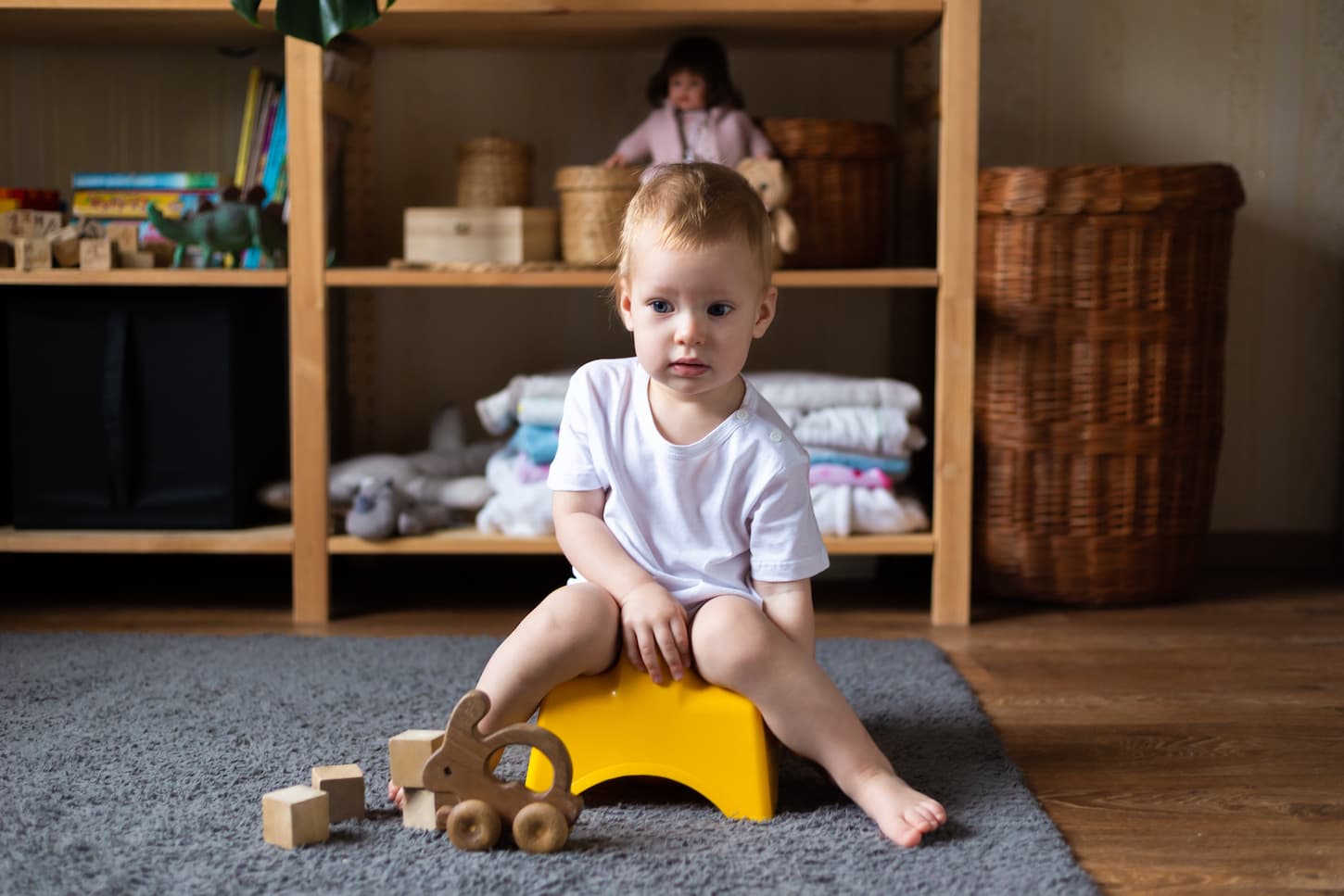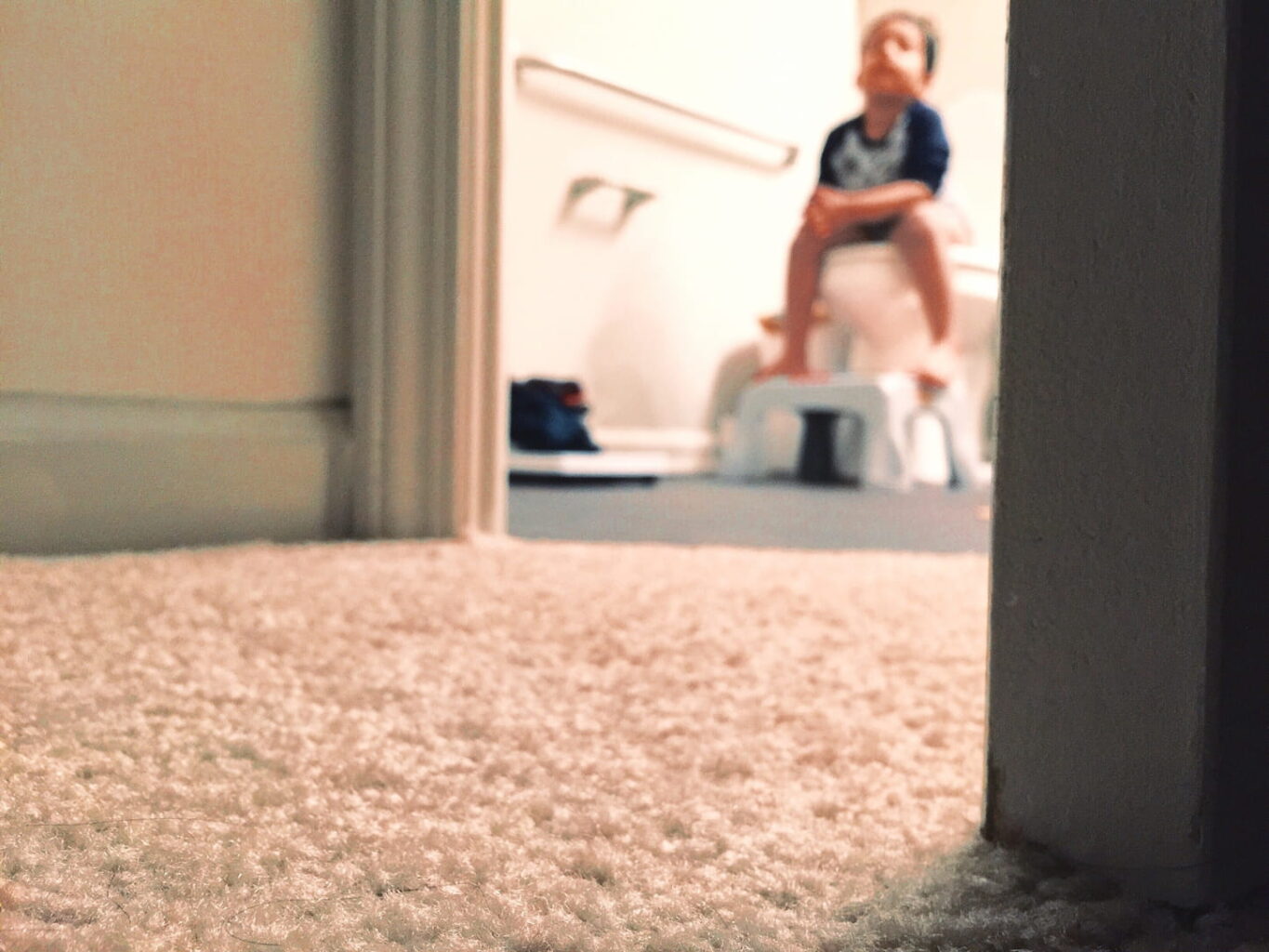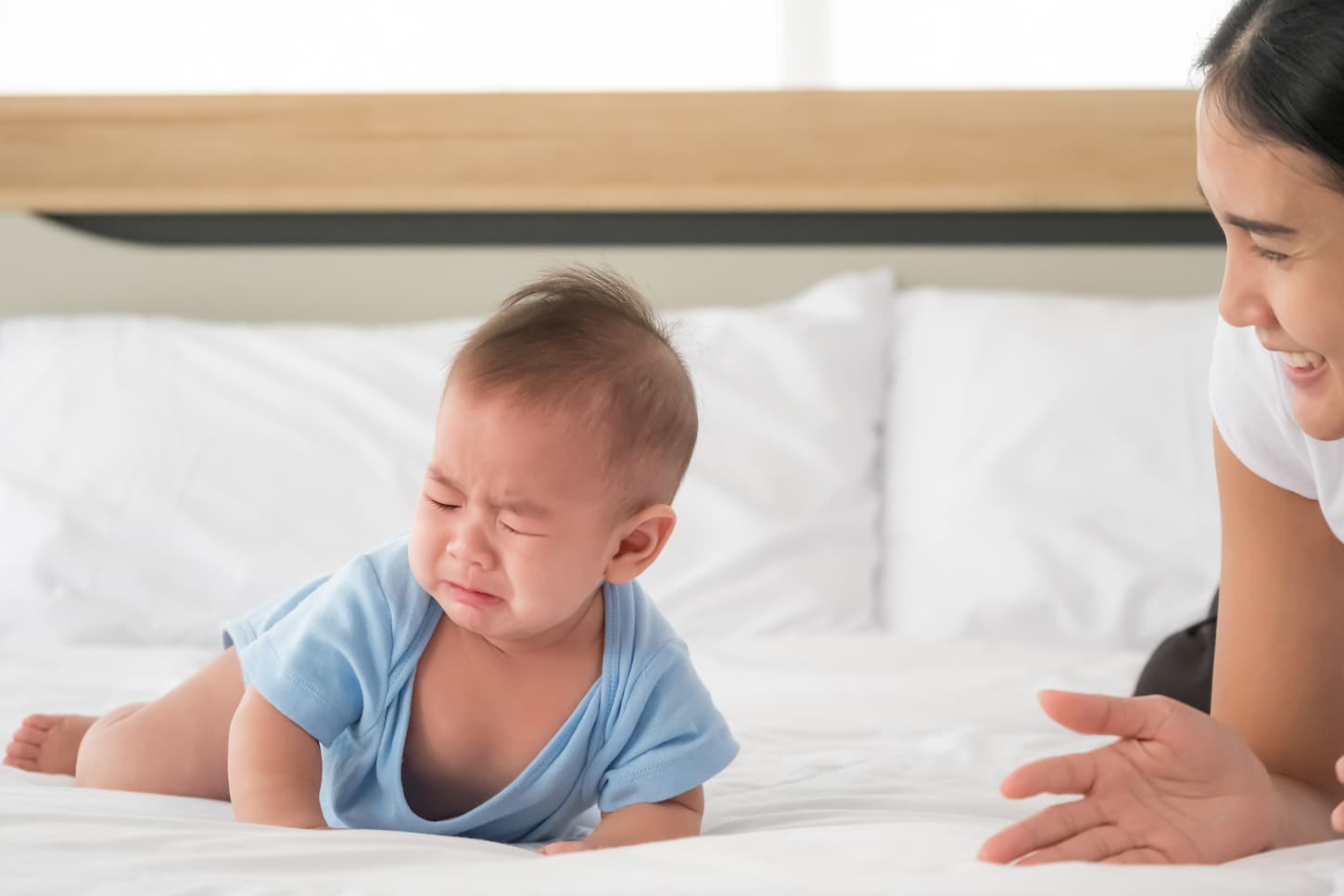While potty training my kids, I quickly discovered that suddenly they weren’t sleeping so well – and they woke up a ton more than usual. I wonder – does potty training cause sleep regressions?
Potty training can cause sleep regressions during both daytime and nighttime sleeping due to increased awareness, anxiety, and delay tactics. Managing this sleep regression is best done with proper knowledge, and patience, and by focusing on quality sleep instead of immediate potty training results.
Between potty training and sleep training four children, I’ve done a lot of research about both. So let’s talk about how they’re related.

Can Potty Training Cause Sleep Regression?
Potty training is an important life skill – and because it’s such an important skill, it can trigger sleep regressions.
Now, at the same time that we potty train kids, there are several other things going on. These other factors could be contributing to or causing the sleep regression by themselves.
Here are some of the concurrent sleep regression triggers:
- Toddlers who are potty training may also be experiencing age-related sleep regression.
- Potty training may cause an anxiety-induced sleep regression.
- Kids who potty train may experience sleep regression caused by separation anxiety.
So while potty training could be the cause of a particular sleep regression, it might not be the main or determining cause. It’s hard to know for certainty. That’s okay – and totally normal.
Potty training caused sleep regressions can impact daytime naps, nighttime sleep, or both. And because daytime potty training is different than nighttime potty training, this whole scenario is likely to happen twice – once for each type of potty training.
How Potty Training and Sleep Affect Each Other
Potty training is a huge new skill that children learn. It’s teaching them a new awareness of their body (and bodily functions like peeing and pooping).
This new awareness comes with a lot of weird new sensations, feelings, and concerns. And any of those things could wake up a child at night – or during naps.
So let’s look at some of the most common ways that potty training impacts sleep.
| Reason | Naps | Nighttime Sleep |
|---|---|---|
| The sensation of voiding (peeing or pooping) | The child may wake up to the feeling of peeing in their diaper or the new warmth in their diaper. | A child may worry about waking up to the feeling of voiding – and that anxiety keeps them up. |
| The feeling of a full or dirty diaper | Children could wake up from a nap with a full, poopy diaper – and they realize they really don’t like how that feels. | Toddlers wake up in the night to a full, wet diaper – and realize they very much dislike the chafing feeling and try to strip it off. |
| A child feels like they need to void (pee or poop) | The child wakes up from a nap early, needing to use the potty. | The kid wakes up in the middle of the night (or just super early) and needs to go to the potty and screams for help. |
| Kids’ bladders can’t hold it in for the duration | Most kids can hold it during a nap – unless it’s a particularly long nap. | Most kids can’t hold it for 10-12 hours. They’re either going to release the excrement while asleep – or wake up. |
| Increased effort to remember to use the potty | Trying to remember to use the potty may impact nap quality or length. | The increased effort to remember to use the potty may cause increased nighttime wakings, dreams, or quality of sleep. |
| Your child learns that saying they need to pee gets attention | Toddlers quickly learn that screaming “poop!” can delay naptime. | Children learn that needing to use the potty at bedtime is a fantastic delay tactic that almost never gets ignored. |
| Light sleepers may wake up more easily to new sensations | Needing to pee (or poop) may trigger less restful naps for light sleepers. | Frequent night wakings to pee (whether real or imagined) may lead to overtired toddlers – quickly. |
| Deep sleep affects potty training efforts | During a particularly deep nap, children may not wake up to void or notice it happened. | While sleeping deeply at night, children won’t wake up or notice they voided. This can be a one-time or a regular occurrence. |
In other words, there are a ton of possibilities as to how your children will react to both potty training and a potty training-related sleep regression.
Example: a 2 1/2-year-old toddler is potty training. One day, they have a crummy nap. Knowing their toddler is exhausted, the savvy parents preemptively implement an early bedtime. This early bedtime leads to deep, restorative sleep – and the child doesn’t wake up to use the toilet. The parents are frustrated and wonder how they failed at potty training.
In this very-common example, it’s not a potty training failure. It’s part of the natural progression of potty training: daytime control comes first. Nighttime control takes a lot longer. Remember that fact, though? That’s the hard part.

How Long Does Potty Training Affect Sleep?
On average, daytime potty training can be successfully completed in as little as a couple of days. However, most childhood development experts agree that full bladder and bowel control can take up to a year or more to achieve.
In other words, potty training can affect sleep for more than a year. And that’s just for daytime potty training!
Now, just because it can take a year doesn’t mean it will. Just know that it can.
Nighttime potty training, on the other hand, can affect sleep for several years. It’s going to depend on how deeply your child sleeps – and how they react to nighttime potty training. We’ll talk about heavy sleepers in a little bit, so hang on for that.
In the meantime, just know that nighttime potty training usually takes longer than daytime potty training – so it can affect sleep for years. And not only is that totally normal, but it’s also just fine.
The research I’ve read indicates that enuresis (peeing the bed at night) can be completely normal and expected for children as old as 5-6 years of age.
In other words, your child may not be completely nighttime potty trained until they start school. That’s not a reason for schoolmates to tease them – it’s just part of normal human development.
Night Wakings While Potty Training
Many children who are potty training experience some kind of a night waking.
- Some children wake up, don’t know why, and may go right back to sleep.
- Other children wake up and realize something is wrong but can’t identify what is wrong. Often, these kids begin crying and calling for help trying to figure out what’s wrong.
- Some kids wake up, recognize they need to go potty, and call for help.
- Other kids wake up and realize they need to go potty and take care of business. Some of these kids even go back to bed – all on their own.
So there’s a huge spectrum of possibilities for reasons, reactions, and what could happen. It’ll depend on your child, their age, their reaction to potty training, and whether they’re wearing a nighttime diaper, pull-ups, or underwear.
Example: some children are super excited to wear their big-kid undies at night once they’re daytime potty trained. However, after several nights of “failure” and frequent wakings, everyone is tired and frustrated.
In these cases, it’s perfectly fine to either put a training potty in the child’s room for easier access – or to take a break from potties at night altogether. Needing to wear a pull-up at night until properly nighttime toilet trained is just fine – especially if it helps everyone get better sleep.
Toddler Sleeping More During Potty Training?
Some children will actually end up sleeping more often while potty training. This can happen for one of several reasons:
- Potty training is exhausting – all the mental effort of trying to remember what to do has exhausted kids and they need more sleep.
- Trying to remember to use the potty has the kid waking up multiple times during naps or at night – leaving the child exhausted and sleeping more to make up for the frequent wakings.
- Learning new skills or the frequent wakings has caused sleep regressions – and the child is sleeping more to recover.
So if your child is sleeping more while potty training, let them. They’re probably exhausted.
Tip: Consider letting exhausted toddlers “have a break” from potty training while sleeping. Tell your child that the potty needs a break and let your kid wear a pull-up. That way, they can get some quality sleep and try again when they wake up.
Nighttime Potty Training for Heavy Sleepers
Some children are naturally heavy sleepers – and that’s just fine. These children may be able to daytime potty train just fine. However, nighttime potty training may be a totally different experience.
Heavy sleepers have a more difficult time waking up to the sensation that they need to pee or poop. They also have a harder time waking up to a wet diaper, wet bed, or anything else.
For these children, don’t feel like nighttime potty training is a failure if they can’t do it by 5-6 years old. In fact, I’ve met some children who have difficulty with complete nighttime potty training until they’re almost 10 years old.
If your child is a heavy sleeper who isn’t fully nighttime potty trained, don’t feel bad. Talk to your doctor to make sure there are no underlying medical concerns. But then don’t make a big deal about it. The extra concern and anxiety will only make things worse – and your child already doesn’t have any control of the situation.
Buy big kid nighttime diapers or use puppy pee pads under the sheets. In some cases, you may need to combine the two.
But please don’t make it a big deal. Remember that this is something that happens and it’s more common than most people will admit.
Just remember that you may need to say no to any sleepovers for school-aged heavy sleepers who still have issues with nighttime voiding – especially with friends or family who don’t understand that this isn’t a concern.

How Often Should I Wake my Toddler to Pee?
After extensive research, there are two main schools of thought on waking up toddlers to pee.
Some people think that it’s just fine to wake up toddlers to pee. They recommend waking your child up before you go to bed to use the potty. And for many children, this is a fantastic option.
Others think that waking up a child is a horrible idea and a sure way to cause children extra anxiety – or sleep regressions from lost sleep. This is true for many children.
In my opinion, it’s going to depend on what your child needs. Consider these factors:
- How well does your child get back to sleep after being woken up?
- How much anxiety does your child have about nighttime potty training?
- How important is quality sleep for your children?
- How does this jive with your parenting style?
Personally, waking up a toddler to go potty isn’t my style. Our kids all have trouble sleeping and are worriers, so we prefer to focus on quality sleep. My kids wear pull-ups until they become nighttime potty trained on their own – however long it takes.
Tips to Make Nighttime Potty Training Easier
Once you’re ready to really tackle nighttime potty training, let’s go over some tips to make things easier – and cause as little sleep disturbance as possible.
| Misconceptions that Masquerade as Tips | Why It’s a Problem | Tips that Actually Help and Work |
|---|---|---|
| Limit food and drinks before bed. | Limiting food and drink can cause kids to be hungry and thirsty – and that’s going to wake them up – more reliably than having to pee will. | Encourage a trip to the potty before bed. |
| Reward kids under age 4 with dry undies in the morning with a sticker. | Kids under the age of 4 have a very difficult time “holding it” for 10-12 hours. During the day, on average they pee every 2 hours. | Treat dry undies in the morning as a wonderful surprise. |
| Kids, once potty trained, can get up and go potty at night by themselves. | Most kids need help during the daytime – they’re going to need more help going potty at night, in the dark, while half asleep! | Put a nightlight in the bathroom and have an assigned on-call parent for potty duty each night. |
| Kids who are potty training may be growing out of naps. | Some kids who are potty training might be outgrowing naps. Others are going to need more sleep. | Watch your child’s behavior and let that help guide you to adjust nap and bedtimes. |
| Don’t let your kids have water in bed. | Having water in bed (in a sippy cup) ups the chances of nighttime peeing. However, some kids are genuinely thirsty and need nighttime hydration. | Weigh the benefits of a hydrated child with the risk of a wet pull-up or bed. |
| Turn on all the lights to help your child really wake up so they can use the bathroom on their own. | Turning on lights in the middle of the night will really wake them up – and make it hard to get back to sleep! Plus, it’ll wake you up, too. It’s a massive sleep disruption. | Keep things sleep-friendly. Plan bathroom trips that are as dark, boring, and get-back-to-sleep oriented. If needed, use a small nightlight. |
| Set up a training potty in the kids’ room so they can use that. | When an adult helps, this idea can work really well. When kids try to do this by themselves, pee gets everywhere. | When your kid calls for help, take the training potty in with you. Then, take it back out again and immediately dispose of the waste. |
Just remember the most important nighttime potty tip: most children aren’t able to be fully nighttime potty trained before the age of 4 (or even 5).
So far, only one of our kids has been fully nighttime potty trained before the age of 4. From 4-5, he had a few accidents when he got ill. But otherwise, he’s good to go.

Potty Training and Night Terrors
Sometimes, the anxiety related to potty training can cause nightmares. And when those nightmares are coupled with a lack of sleep (also caused by potty training), you can quickly end up with night or sleep terrors.
Sleep or night terrors are kind of like sleepwalking. The person experiencing may or may not be fully awake. But they’re going to be screaming, flailing, and may even be looking around. Here’s what they may look like:
- Screaming or thrashing
- An intense sense of fear
- Rapid breathing
- A rapid, pounding pulse (you may be able to feel their heartbeat simply by placing your hand on their chest)
- Sweating
- Eyes, if open, might be wide and dilated
- May not be awake or aware of surroundings
- May only be partially awake or aware of surroundings
- May not remember the episode in the morning
Sleep terrors are usually pretty short, only lasting a few seconds or minutes. However, they can last much longer.
Sleep terrors affect almost 40 percent of children and a much smaller percentage of adults. However frightening, sleep terrors aren’t usually a cause for concern. Most children outgrow sleep terrors by their teenage years.
Mayo Clinic
Officially, night terrors only happen at night. But in both my experience and research in talking to other parents, sometimes sleep terrors can also happen at nap times.
They are much more likely to happen when your child is overtired, overstimulated, and in the middle of sleep regressions. So if your child has had night terrors in the past, they may show up again while potty training.
The good news is that your child will outgrow sleep terrors – and they will have fewer episodes when they are getting adequate sleep. So the best treatment is an early bedtime – and waiting them out. Especially while you’re potty training.
For example, each of our kids experienced severe sleep terrors. Some lasted hours. Most happened right about the time our kids were of potty training age. All we could do was wait them out. We found that early bedtimes and a dedicated focus on quality sleep hygiene are the only way to help prevent them.
Potty training does take time and it can be a lot of hard work. But when you let your child potty train on their schedule and you focus on helping them get good sleep, things do work out. Even the sleep terrors will resolve. Just give it time.